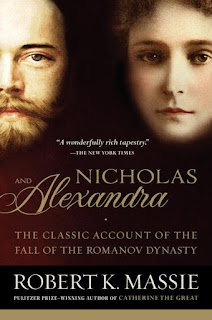Nicholas and Alexandra is "the classic account of the fall of the Romanov dynasty." Focusing largely on Nicholas II's reign as Russian Tsar (1894-1917), the book sweeps through his early days, engagement to Alexandra (a German princess), their five children, World War I, the Russian revolution, and the brutal end of the family suffered at the hands of the Bolsheviks. Also discussed are Russia's best-known rulers (Ivan the Terrible, Peter the Great, Catherine the Great), the famous artist Fabergé, and the enigmatic Rasputin- the raunchy monk who appeared capable of healing the heir, Tsarevich Alexis, of his hemophilia.
This is an excellent book. Massie's style is straightforward but compelling and informative. He provides the right amount of detail, and his accounts of tangential/contextual issues (like prior Russian Tsarist history, Rasputin, Lenin, Alexis' hemophilia, and more) are brief but fantastic. I believe this to be the most fascinating period of Russian history, and Massie's book covers it wonderfully. Of course, one could argue that this time period is monumental across Europe, as "In 1913, the gilded world of the European aristocracy seemed at its zenith. In fact, fashionable society, like the rest of mankind, stood one step from the abyss." Both zenith and abyss, at least as it related to Russia, are well-covered here.
I learned more than I expected about leadership from this book. Most consider Nicholas II an out-of-touch buffoon. This work, however, provides a largely sympathetic portrait of the man. He's presented as a well-meaning monarch beset by natural timidity, parental anxiety (largely due to his son's ailment), and bad influences (in his wife and mother, Rasputin, etc.). As a leader, I view his principle failures as follows:
- He was not transparent. The family wanted to hide the Tsarevich's hemophilia from the public. It's understandable- they wanted to present a strong front, and America did the same with FDR's condition. However, the family's resulting secretive ways and odd actions were misinterpreted by the population, and they all suffered as a result. It would have been better to be up-front about the condition- the public would have (probably) been sympathetic vice suspicious.
- He ignored reality. Several along the way warned Nicholas of public discontent; the Tsar ignored them, choosing instead to listen to those who claimed Russians loved him. Another condition common to man, we often hear only what we want to believe and disregard the rest. It cost Nicholas his life.
- He gave in to fools. Because of his (mystifying) ability to heal the Tsarevitch and prophesy, Rasputin's influence was huge on the Empress- and by extension, on Nicholas. Alexandra, at Rasputin's urging, would bombard Nicholas with political recommendations, many of which proved disastrous. Nicholas, usually suspicious at first, repeatedly caved- as previously mentioned, he was timid. It didn't end well. Hemophilia brought Rasputin, who brought insanity, which brought revolution. One wonders how history would have been different, had Alexis Romanov's blood been able to clot normally.


No comments:
Post a Comment